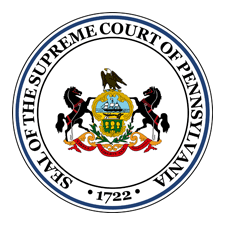Danganan v. Guardian Protection Services
Argued: November 28, 2017 before the Pennsylvania Supreme Court No. 36 WAP 2017 by Michael D. Donovan for the Appellant
Pennsylvania Supreme Court Opinion February 22, 2018
Pa. Ruling May Spur More Class Suits Against In-State Companies
By Dan Packel
Law360 (February 22, 2018, 5:45 PM EST) — In the wake of a recent Pennsylvania Supreme Court finding that nonresidents can sue Pennsylvania businesses over out-of-state transactions under the state’s consumer protection statute, experts expect a rise in the number of national class actions targeting Keystone State companies, which will test the court’s expectation that other legal principles will ward off unjustified claims.
In a unanimous ruling Wednesday, the justices found that the state’s Unfair Trade Practices and Consumer Protection Law contained no geographical restrictions that stood in the way of out-of-state claims.
Pennsylvania companies that could credibly be accused of deceptive business practices could soon see an impact from the ruling.
“This isn’t out of the norm, because other states have interpreted similar statutes in similar ways,” said John Papianou, chair of the litigation department at Montgomery McCracken Walker & Rhoads LLP. “But it will definitely provide a boon to class action lawyers looking to bring national class actions against Pennsylvania businesses.”
“It will eliminate some of the barriers to nationwide class claims under the statute, where the merchant involved has those ties to Pennsylvania,” he said. “Often when you’re looking at trying to get a remedy or redress for a group of consumers in multiple states, it makes it more difficult when you have to look at the law of 25 or 50 states. There’s no reason why Pennsylvania’s one law shouldn’t apply to all of them.”
At the same time, the Supreme Court has demonstrated concern about runaway litigation, and its opinion indicated that other courts would likely apply alternative doctrines to prevent many cases from moving forward.
During oral arguments in November and in the opinion issued Wednesday, justices exhibited sympathy toward defendant Guardian Protection Services’ concerns that an adverse ruling would put Pennsylvania businesses at risk. In November, Justice Max Baer raised the prospect of a customer anywhere in the world bringing claims under the law against Pittsburgh’s Heinz over the company’s ketchup.
Michael Donovan, counsel for plaintiff Jobe Danganan, responded that as the statute has no geographical limitations, it was not the court’s job to reduce its scope.
The justices ultimately agreed with Danganan. But they went on to assert that other legal precepts — specifically, rules on jurisdiction and choice-of-law — offered another way to limit these lawsuits.
“They really just say, ‘It may cover misconduct outside of the state, and other legal principles may be the check and balance against it going too far,’” Duane Morris LLP partner Charlotte Thomas said of the statute.
She emphasized that the justices had fashioned a limited ruling, with implications that will not be clear until other courts have the opportunity to weigh in.
“A lot of the trial and immediate courts will be trying to figure out the jurisdictional checks and balances that the court has said are going to apply,” Thomas added.
“It’s not going to create a flood of class litigation, because of the other issues that always come into play in class cases,” Flitter said.
Danganan’s own case will provide an early test. The California resident sued Guardian under the consumer protection statute in 2015 over a contract for home protection services at his Washington, D.C., home. According to court documents, he entered into a five-year contract with a $44.95 monthly services fee with the company in April 2013 but moved to California, sold his house and canceled the contract in fall 2014.
He said that although he provided Guardian written and verbal notice of cancellation, the company continued billing him even though he no longer lived in or even owned the house.
Danganan said he followed a forum selection clause in the contract that obligates that all disputes be subject to Pennsylvania law when he initially filed his suit in the Philadelphia County Court of Common Pleas. Guardian later removed the case — which seeks to represent a nationwide class of Guardian subscribes who had been billed after cancellation — to federal court, where it was then tossed. Danganan then appealed to the Third Circuit, which asked the state Supreme Court to address the consumer protection statute.
Now that the Supreme Court has concluded that Danganan’s out-of-state status does not bar him from relying on the Pennsylvania statute, the federal district court will consider a lingering choice-of-law question: whether language in the Guardian contract subjecting disputes to Pennsylvania law only applies to breach of contract claims, or to all claims, including those under the UTPCPL.
Future cases brought by out-of-state plaintiffs will further show what other limiting factors might apply.
“The question is, Whether other courts will look at this and decide it’s carte blanche?” Thomas said. “They might. But I don’t think [the justices] intended it that way.”
Furthermore, Flitter reasoned, honest Pennsylvania businesses should welcome any ruling that tilts the playing field in their favor, over unscrupulous competitors. That’s especially true in the context of other states reaching similar interpretations over the wide reach of their consumer protection laws.
“If an out-of-state company can set up shop here and not be subject to Pennsylvania laws, then really the cheater is at an advantage to an honest business, and that should not be welcome,” he said.
Danganan is represented by Michael Donovan of Donovan Litigation Group LLC and Christian Schreiber of Chavez & Gertler LLP.
Guardian is represented by Laura E. Vendzules and Michael A. Iannucci of Blank Rome LLP.
The case is Danganan v. Guardian Protection Services, case number 36 WAP 2017, in the Supreme Court of Pennsylvania.
–Editing by Pamela Wilkinson and Kelly Duncan.
All Content © 2003-2018, Portfolio Media, Inc.
Pa. Ruling May Spur More Class Suits Against In-State Cos. – Law360







 Michael D. Donovan Selected to Pennsylvania Super Lawyers 2004-2023
Michael D. Donovan Selected to Pennsylvania Super Lawyers 2004-2023